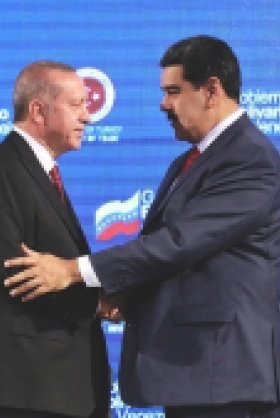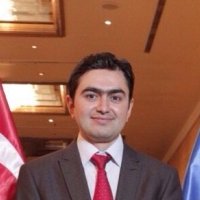Turkey and Venezuela: An Alliance of Convenience



On March 26th, U.S. Attorney General William Barr announced indictments against Nicolás Maduro and 14 other senior current and former Venezuelan officials, for narco-terrorism, drug trafficking, corruption, and other crimes. Also indicted were two leaders of Colombia’s FARC guerrillas.
These indictments follow other crippling U.S. sanctions on Venezuela’s financial and oil sectors, and secondary sanctions on Russian and other companies continuing to do business with the Maduro regime.
How, then, does the Maduro regime survive?
Part of the answer lies in the brutal crushing of dissent from within civil society and the military. But another part has to do with the international alliances Maduro has forged with a range of allies such as Russia, China, Cuba, and India.
This report on the relationship between Turkey and Venezuela argues that Recep Tayyip Erdoğan has drawn close to Maduro “based on the two leaders’ mutual dislike of the West and frustration with U.S. sanctions.” Written by former Turkish diplomat in Venezuela, Imdat Oner, the report argues that “the gold trade has been the most obvious manifestation of the growing commercial links between Ankara and Caracas.” Although the scope of the dealings is shrouded in secrecy, “Venezuela has sold a substantial amount of gold to Turkey in exchange for basic food supplies,” including for the government’s food subsidy program known as the CLAP.
Despite their ideological differences, Oner argues that the two authoritarian leaders have developed strong personal ties. But Venezuela still accounts for a fraction of Turkey’s total trade and the relationship between the two governments is not deeply institutional.
Author


Latin America Program
The Wilson Center’s prestigious Latin America Program provides non-partisan expertise to a broad community of decision makers in the United States and Latin America on critical policy issues facing the Hemisphere. The Program provides insightful and actionable research for policymakers, private sector leaders, journalists, and public intellectuals in the United States and Latin America. To bridge the gap between scholarship and policy action, it fosters new inquiry, sponsors high-level public and private meetings among multiple stakeholders, and explores policy options to improve outcomes for citizens throughout the Americas. Drawing on the Wilson Center’s strength as the nation’s key non-partisan policy forum, the Program serves as a trusted source of analysis and a vital point of contact between the worlds of scholarship and action. Read more


Middle East Program
The Wilson Center’s Middle East Program serves as a crucial resource for the policymaking community and beyond, providing analyses and research that helps inform US foreign policymaking, stimulates public debate, and expands knowledge about issues in the wider Middle East and North Africa (MENA) region. Read more

Explore More
Browse Insights & Analysis
Greenland’s New Governing Coalition Signals Consensus

Myanmar’s Junta and the 2026 Elections: A Fig Leaf for Legitimacy?

